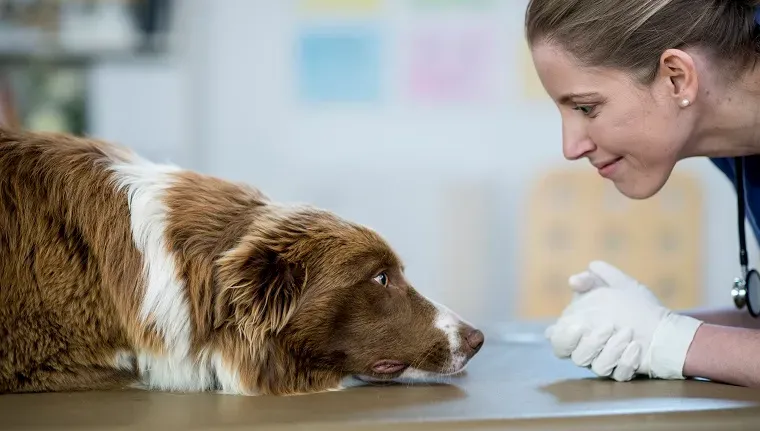Urinary tract infections (UTIs) can cause significant discomfort in dogs and can lead to more serious bladder and kidney problems. It’s important to recognize the signs and symptoms of a urinary tract infection in your dog so you can treat it quickly.
If you’ve ever had a bladder or urinary tract infection, you know the severe discomfort it can cause. Similarly, canine urinary tract infections can be stressful for your furry companion. Unfortunately, these bacterial infections are very common in humans, cats, and dogs, and approximately 1 in 3 dogs will develop a urinary tract infection at some point. By understanding how canine urinary tract infections work and how to treat them quickly and effectively, you can greatly reduce your pup’s discomfort and get them back on their feet quickly.

What Causes Urinary Tract Infection in Dogs
There exists many factors that can contribute to urinary tract issues in dogs, including:
- Bladder inflammation or infection
- Stress
- Presence of stones, crystals, or debris in the bladder or urethra
- Inability to retain urine due to excessive water consumption or weakened bladder muscles
- Traumatic injuries
- Prostate disease
- Congenital abnormalities
- Abnormalities in the spinal cord
- Cancer
Urinary tract infections (UTIs) tend to be more prevalent in older female dogs and those with diabetes. Additionally, dogs afflicted with bladder stones are at a heightened risk of experiencing recurrent UTIs. Moreover, lower urinary tract diseases and UTIs are frequently observed in senior dogs aged seven and above, encompassing all breeds and genders. Understanding these underlying causes is crucial for effective management and treatment of urinary tract issues in our beloved canine companions.
Warning Signs of Urinary Tract Infections In Dogs
Detecting UTI symptoms in dogs requires keen observation and awareness of certain signs. Common indications of a UTI in dogs encompass:
- Increased frequency of urination accompanied by minimal urine output
- Struggling or exhibiting discomfort while attempting to urinate
- Vocalization such as crying or whining during urination
- Presence of blood in the urine
- Accidents indoors, indicating difficulty holding urine
- Unintentional leakage of urine
- Excessive licking of the genital area
Moreover, if the infection extends to the kidneys, additional symptoms may manifest, including:
- Elevated body temperature indicating fever
- Noticeable lethargy or fatigue
- Episodes of vomiting
- Displaying signs of abdominal pain or discomfort
In the case of intact male dogs, bacteria causing a UTI can potentially spread to the prostate, resulting in additional symptoms such as:
- Back pain
- Abdominal discomfort or pain
- Difficulty in defecation, often characterized by straining
- Alteration in gait, potentially appearing stiff or awkward
- Loss of interest in regular activities or reluctance to engage in them
Recognizing these signs promptly can aid in seeking appropriate veterinary care and ensuring timely treatment for your dog’s well-being.
Treating Urinary Tract Infections in dogs
Similar to urinary tract infections (UTIs) in humans, UTIs can cause significant discomfort in your dog, and symptoms can worsen if veterinarian intervention is delayed. If left untreated, the infection can progress and affect the kidneys and prostate. Although the urge to purchase over-the-counter medications can be strong, it is important to avoid administering human medications as they can be harmful to your pet.
If you suspect your dog is suffering from a urinary tract infection, it is important to contact your veterinarian. Your veterinarian may advise you to make an appointment for a thorough examination and diagnostic evaluation. Please consult your veterinarian before collecting a urine sample as some situations may require sterile collection methods at the clinic and your dog may not be able to urinate immediately prior to the appointment.
Diagnostic procedures commonly used by veterinarians may include a urine test aimed at detecting bacteria, abnormal blood cells, and crystals in the urine that may indicate the presence of bladder stones. Additionally, your veterinarian may recommend a urine culture. This requires a sterile urine sample to detect bacterial growth. This test, combined with sensitivity analysis, helps determine the specific bacteria in your dog’s urine and how they respond to various antibiotics. Typically, the primary treatment for a urinary tract infection in dogs is antibiotics. However, which antibiotic is prescribed will depend on factors such as the severity of the disease, your dog’s clinical symptoms, and your veterinarian’s current protocols. If you would like to collect a urine sample, you can choose to collect the sample at home or have your veterinarian test it at the clinic. Your veterinarian may prefer to collect the sample at the clinic, so it is important to determine your veterinarian’s preferences in advance. If you are instructed to collect a urine sample at home, follow the instructions below:
Taking a Urine Sample at Home:
Dr. Marx recommends collecting urine whenever possible when your dog urinates on the first morning, as this is usually the most concentrated sample. When collecting urine, use a clean, tightly sealed container.
Alternatively, you can carefully slide a ladle under your dog while he is urinating to catch the sample and transfer it to a clean container. However, it is important to note that to ensure the accuracy and reliability of test results, urine samples collected at home must arrive at the veterinarian’s office within two hours.
Gathering a Urine Sample at the Veterinary Facility:
If it is difficult to collect a urine sample at home, your veterinarian can quickly obtain a sterile sample using a needle. Marx says the procedure is usually well tolerated by most dogs. If your veterinarian wishes to perform a urine culture, please note that a sterile sample is mandatory. Therefore, it is recommended that you consult your veterinarian before collecting a urine sample at home.
If crystals are detected in the urine sample, your dog may need her x-rayed to confirm the presence of bladder stones. Bladder stones can cause recurring bladder infections and require appropriate treatment.
Treating a dog’s urinary tract infection, as outlined by Marx, usually requires a simple course of antibiotics for 7 to 14 days. Additionally, you may want to encourage your dog to drink more fluids to help remove bacteria from the bladder.
According to Marx, a dog’s condition should noticeably improve within 48 hours, and in some cases within 24 hours, after starting antibiotic treatment. However, to completely cure a urinary tract infection, it is important to follow the medication regimen as prescribed by your veterinarian. Your veterinarian may schedule a follow-up test to re-evaluate the urine and confirm bacterial clearance.
How to Prevent Urinary Tract Infections
Some owners may consider giving their dog yogurt to treat UTIs, as it is believed to promote a balanced dog microbiome. However, the effectiveness of this method varies and does not produce consistent results for all dogs. Instead of trying home remedies, it is recommended that you consult with your veterinarian for individual recommendations on how to prevent or treat UTIs.
According to Marx, one of the most effective prevention measures against UTIs is to provide your dog with plenty of fresh water. Additionally, maintaining a routine of regular walks and frequent potty breaks throughout the day can help support your dog’s urinary health. If urinary tract infections recur, your veterinarian may suggest adding supplements to your dog’s diet. Dr. Dr. Marx says, “Cranberry and vitamin C supplements can benefit dogs with chronic urinary tract infections by regulating urine pH, but certain supplements can make urinary tract infections worse.” says. It is important to consult your veterinarian before treatment, as it can worsen the urinary tract infection. Infections, especially when calcium oxalate is involved. In addition, underlying medical conditions can cause recurrent UTIs that are difficult to heal. Your veterinarian may recommend further diagnostic tests to determine possible causes of chronic urinary tract infections, allowing for a more targeted and effective treatment approach.

I am a dedicated writer, specializes in crafting captivating content centered around Dogs. With a keen eye for detail and a passion for dogs, I delivers engaging narratives that celebrate the bond between humans and their Doggos.


